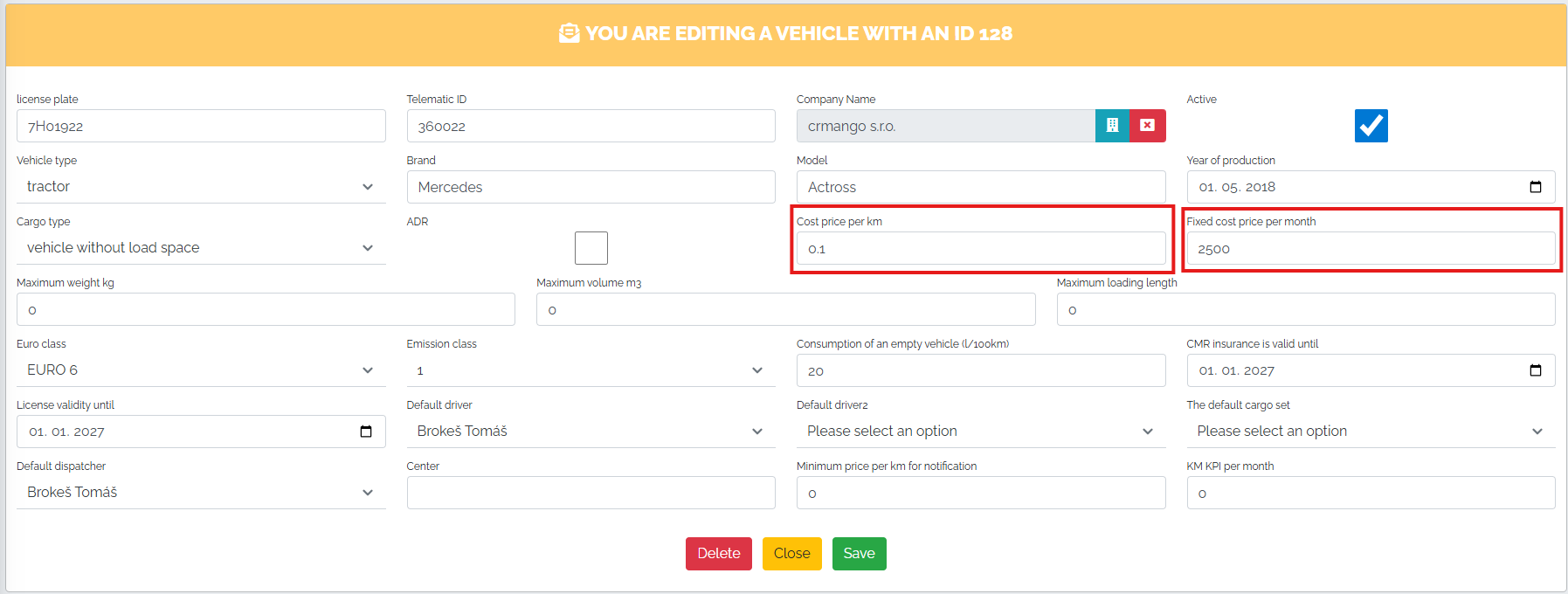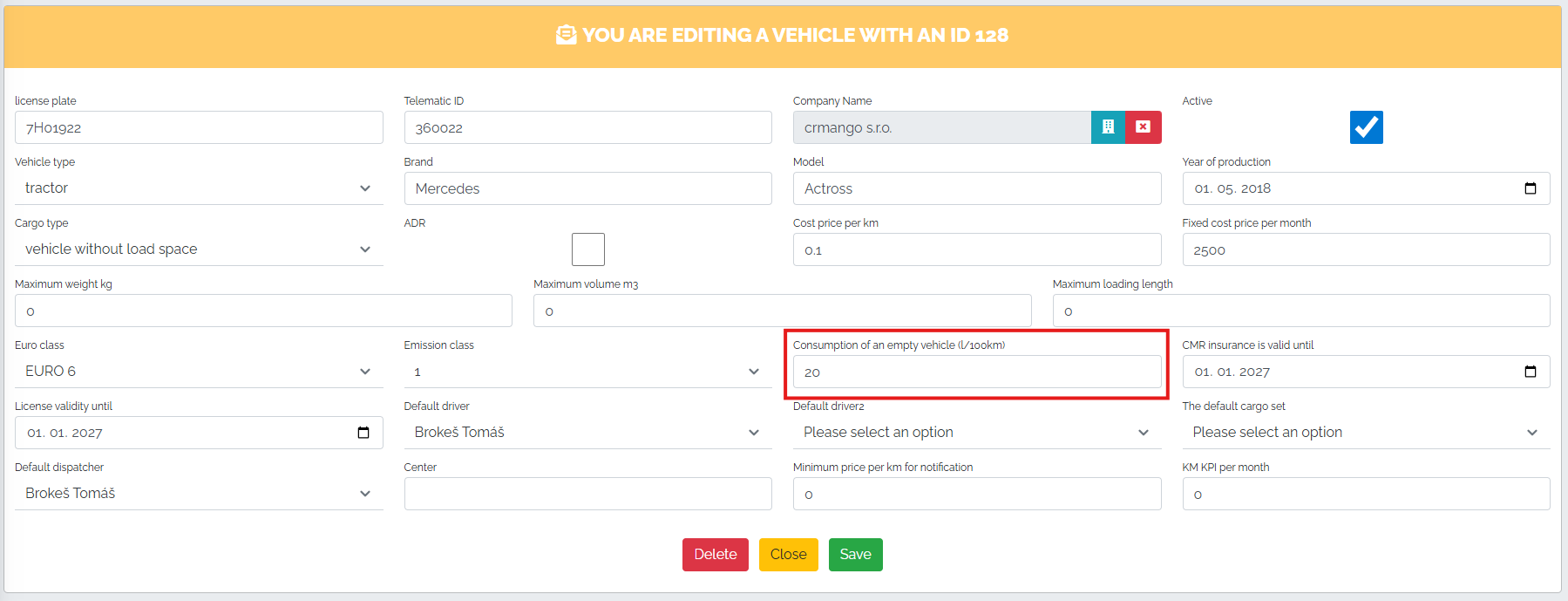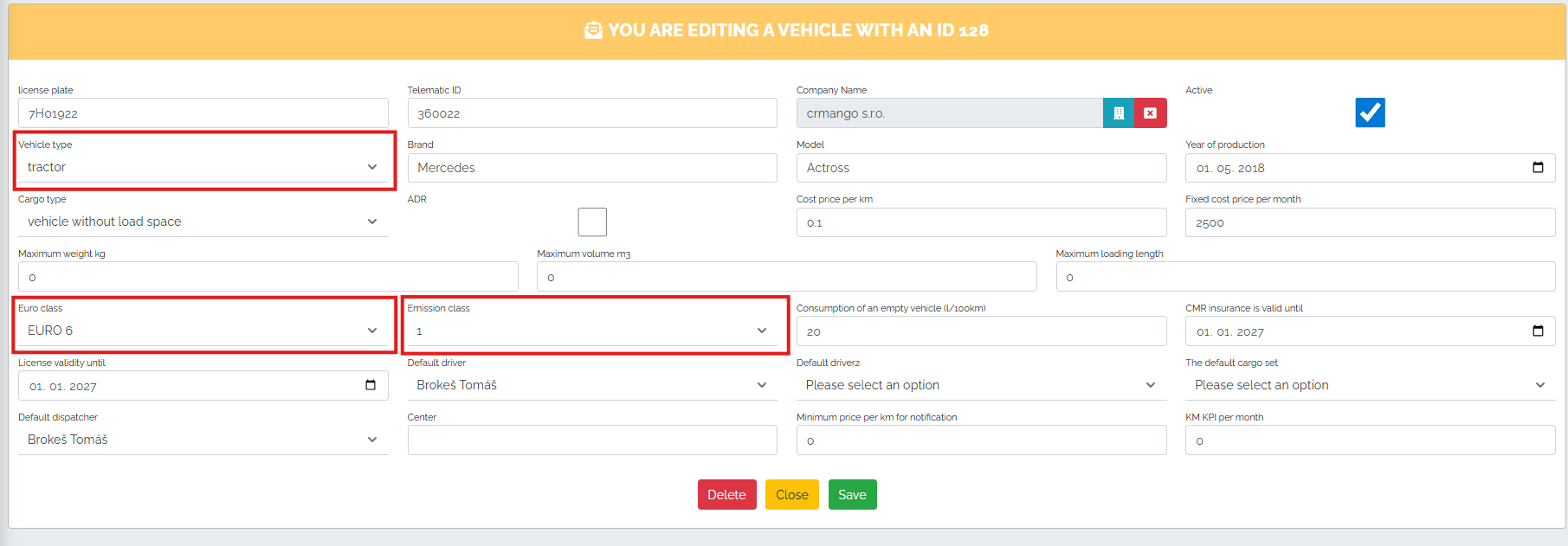The total value of the cargo for transport includes the following items:
- Price per vehicle - includes fixed and variable costs according to the settings of a specific vehicle,
- Price per semi-trailer/trailer - also includes fixed and variable costs according to the settings of a specific semi-trailer or trailer,
- Fuel price = vehicle consumption x average fuel price according to settings (vehicle consumption without a semi-trailer/trailer attached),
- Fuel price = trailer consumption x average fuel price according to settings (increase in vehicle consumption when connecting this trailer),
- Fuel price = cargo consumption x average fuel price according to settings (increase in consumption for each ton of cargo on the vehicle),
- Drivers wage price 1,
- Drivers wage price 2,
- Toll price - includes fees for using the roads on the route. In some cases, we also include the costs of using tunnels and ferries.
Below we analyze the individual costs in more detail:
1. Price per vehicle - fixed and variable costs
In the Settings -> Number plates -> Vehicle list section, you can set 2 parameters for the vehicle:
- - price per kilometer,
- Mango works with both parameters at the same time, so it is possible to combine them or use only one of them. If we set the price per kilometer, Mango will automatically include this value in the costs in the order according to the number of kilometers. For example, if the transport is 500km long and the price per kilometer is 0.10€/km, the amount of 50€ excluding VAT will be included in the order.
- If we set a fixed amount of €2,500 and the transport takes, for example, 24 hours (as can be seen in the image below), Mango will calculate the fixed costs proportionally according to the duration of the transport. In this case, the amount of €83.33 excluding VAT will be included. With a fixed cost, it is also possible to set a coefficient for the number of days during which the company is actively driving on average. This coefficient is used so that the fixed cost (€2,500) is not calculated for the entire month (30 days), but only for the real number of operating days - which is, for example, 23 days in a month. Thanks to this, a slightly higher fixed cost is included in each transport so that the entire amount of €2,500 is covered with the planned 23 driving days per month.

2. Price per semi-trailer/trailer - fixed and variable costs
If you also select a semi-trailer or trailer for transport (recommended), the system will automatically add its costs (variable or fixed) to the total costs, just like for the vehicle itself. You can define this starting price in the Settings -> Code lists -> Vehicle list section. If you do not want to fill in the costs of the semi-trailer or trailer for transport, we recommend that you include these costs in the vehicle costs.
3. Fuel price - empty vehicle consumption
- In the Settings -> Codebooks -> Vehicle list section, you can set the empty vehicle consumption that Mango uses to calculate fuel costs. The fuel price is calculated based on this consumption and the current price per liter of fuel - you can find this value in Settings, in the Extension modules - Transport module section. If you have set the consumption to 20l per 100km, as shown in the picture, and the transport is 500km, 100l of fuel will be included in the costs and this value will be multiplied by the price per 1l of fuel according to the Transport module settings:

We can adjust the price for 1 liter of fuel in the Settings->Extension modules -> Transport company module -> Manage module section: 
4. Fuel price – semi-trailer/trailer consumption
If you also choose a semi-trailer or trailer for your transport (recommended), the consumption for the attached semi-trailer or trailer will also be added to the transport cost, and we can define this value in the code lists. We know from practice that the consumption of individual semi-trailers and trailers can vary (not to mention refrigerated semi-trailers). Therefore, we consider it necessary to set this consumption in the Settings -> Code lists -> Vehicle list section and select a specific semi-trailer or trailer. Here is an example: if you set the consumption to 20l on the vehicle and 2l on the semi-trailer, the consumption of an empty vehicle with a semi-trailer will be 22l per 100km. The real amount for fuel will therefore be calculated according to the length of the transport and the amount per liter of fuel. If you do not plan to fill a semi-trailer or trailer for your transport, we recommend setting the vehicle consumption to be equal to the consumption of the set.
5. Fuel price - cargo consumption
The last variable that enters the fuel price is cargo consumption. This is actually an increase in vehicle consumption depending on the amount (ton) of cargo the vehicle is carrying. You can again set this value to the desired value depending on your fleet (Settings -> Extension modules -> Transport company module -> Manage module). For modern trucks, this value ranges between 0.2-0.3l per 1t of cargo. For example, if the transport is 500km and the goods are 10t, setting the consumption to 0.4l/1t will increase the vehicles consumption for the given transport by 2l per 100km. If an empty vehicle with a semi-trailer has a consumption of 22 liters, a vehicle with this goods will have a consumption of 24l per 100 km. If the weight of the goods changes during transport, Mango always recalculates it for a specific route. We define the cargo consumption in this field:

6. and 7. Price of wages of driver 1 and driver 2
Another important cost of transportation is the drivers price. The drivers salary is set directly in your companys contacts directly in the Address Book section -> find your company -> People in the company -> Add a new person. We add a new person - a new driver - and select the Driver option as the Contact type. In the field immediately below it, we find the Hourly wage in Euros field (see the image below). This value is set hourly and is calculated for the entire transportation - so, if the transportation takes 24 hours, the cost per driver will be 24x4= €96 excluding VAT. If you set the working day conversion coefficient to a number less than 30, this amount will be affected by the coefficient (You can adjust the number of days in a month for calculating fixed costs in Settings -> Extension modules -> Transport company module -> Manage module). Lets give an example: drivers wage 4€/hour x transport duration 24 hours = 96€ x 23 days (day coefficient) = 125€ excluding VAT. The drivers hourly wage is still set to 4€ and Mango will already perform the calculation according to the selected coefficient. Of course, the drivers hourly wage can be edited as needed. Based on the basic calculation, we calculate the hourly wage as follows: super-gross drivers wage ÷ 30 days ÷ 24 hours.
This value is calculated automatically by Mango based on the selected vehicle and its parameters. You need to select the Vehicle Type on the vehicle and the transport toll will be added automatically:

In the following image, we can see how Mango calculates the comprehensive costs for a given route: